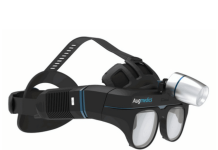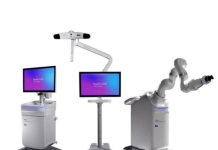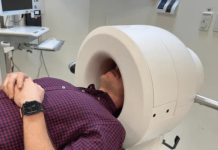- White matter plays a critical role in brain function and reducing white matter atrophy and myelin loss may contribute to slowing Alzheimer’s disease progression.
- Early intervention with Cognito therapy may result in enhanced tissue preservation and reduced neurological damage
- MRI data confirmed the absence of ARIA in patients using Cognito therapy
Cognito Therapeutics, a neurotechnology company advancing disease-modifying therapies to treat CNS diseases, today announced robust lobe-specific changes in white matter volume and myelination in Alzheimer’s Disease (AD) patients following six-months of non-invasive gamma stimulation therapy using the at-home wearable device.
The company presented new imaging data at the Alzheimer’s Association International Conference 2023 from the Phase 2 OVERTURE study, that reported its proprietary gamma sensory stimulation therapy reduced the decline in white matter/grey matter (WM/GM) contrast in the entorhinal region. The entorhinal region of the brain is of particular interest in the early stages of AD, and early intervention with Cognito’s therapy may result in enhanced tissue preservation and reduced neurological damage.
“Our Phase 2 study demonstrated that Cognito’s proprietary disease-modifying therapy reduced brain atrophy and myelin loss in Alzheimer’s patients. Our recent results at AAIC 2023 quantifies the effects of our therapy in the entorhinal region of the brain, which indicates that early intervention with Cognito therapy could enhance tissue preservation and reduce neurological damage,” said Ralph Kern, M.D, MHSc., Chief Medical Officer, Cognito Therapeutics.
Recent studies have reported early changes to oligodendrocytes and transcription of myelin protein genes in the white matter prior to symptoms of cognitive decline, even in subjects with AD but without other neurological comorbidities. Since neuronal activities, particularly network oscillations have been shown to promote axonal myelination, Cognito conducted a post hoc analysis to examine how Cognito’s proprietary non-invasive gamma stimulation affected white matter volume and myelination in different cortical lobes in patients with AD.
Imaging Results from OVERTURE Study
New imaging data reported from the Phase 2 OVERTURE trial showed that white matter atrophy and demyelination were statistically significantly reduced in all lobes of the left hemisphere and trended towards reduction in the right hemisphere, in patients on Cognito therapy versus sham therapy, demonstrating that 40Hz sensory stimulation may reduce the neurodegeneration associated with AD.
A total of 135 subjects were screened, of whom 74 were randomized and 53 completed (20 sham arm, 33 active arm). Daily use of the Gamma Sensory Stimulation System was confirmed to be safe with minimal side effects. MRI data confirmed the absence of ARIA in participants. High adherence to daily therapy was established based on device-recorded usage. In assessing cognitive and functional abilities, changes in ADCS-ADL and MMSE scores were statistically significant between the sham and treatment arms, demonstrating a significant slowing in functional and cognitive decline in the treatment group.
In addition, quantitative MRI analysis revealed a significantly reduced whole brain, white matter, and occipital lobe volume loss, along with a significantly attenuated reduction in occipital cortical thickness in the active arm relative to the sham group. These clinical benefits were achieved independent of a reduction in amyloid plaque loads. Following 6 months of treatment, patients in the Cognito treatment group demonstrated 0.06±0.99% decrease and the placebo group demonstrated 1.26±1.04% decrease in WM/GM contrast (p<0.022).
“Our Phase 2 OVERTURE study results continue to demonstrate that daily, proprietary gamma sensory stimulation is safe and well tolerated,” said Brent Vaughan, CEO, Cognito Therapeutics. “Patients in the active arm demonstrated a reduction in decline in functional and cognitive abilities, and showed reduced brain atrophy. Our upcoming pivotal HOPE clinical trial will further evaluate the clinical efficacy of our treatment, and also evaluate relevant downstream mechanisms in AD patients. We are thrilled to report these findings, which demonstrate the potential of our non-invasive neuromodulation therapy in reducing white matter atrophy, preserving axons, with no ARIA events reported to date in patients on Cognito therapy.”
Cognito’s device is limited by United States law to investigational use only and is not available for sale. For more information on how to join Cognito’s HOPE clinical study that is currently enrolling patients, visit https://www.hopestudyforad.com.
About Cognito Therapeutics
Cognito Therapeutics is a clinical-stage neurotechnology company developing disease-modifying therapeutic approaches to treat neurodegenerative disorders. Its non-invasive neuromodulation platform was developed by MIT Professors and scientific founders Li-Huei Tsai and Ed Boyden. The Company’s lead therapy is currently in a pivotal study (HOPE) in Alzheimer’s Disease and was awarded FDA Breakthrough Device Designation. Cognito is based in Cambridge, MA. For more information, visit www.cognitotx.com. Follow us on Twitter at @cognitotx.




